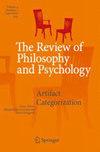自闭症患者的字面主义:一个预测性处理建议
IF 1.8
Q2 PSYCHOLOGY, MULTIDISCIPLINARY
引用次数: 0
摘要
孤独症患者通常被认为是过分的字面主义者,也自认为是,他们倾向于对词语和话语的字面解释。这种字面上的偏见似乎是自闭症特有的,仍然缺乏令人信服的解释。在本文中,我们探索了一个新的假设,有可能解释自闭症中的字面偏见。我们认为,字面主义源于预测系统的非典型功能:具体而言,语言处理中预测和错误信号之间的非典型平衡可能使个体对自己的预测更加不确定。这种不确定性通常通过诉诸最安全的解释来解决,也就是字面上的解释。我们首先回顾一下对其他自闭症特征的现有解释,这些特征吸引了预测处理。然后,我们将这些见解应用于语言,通过展示预测在日常理解中起着关键作用,并且对自己的预测缺乏信心可能会增加理解困难。最后,我们通过讨论隐喻的情况来深入研究语言的非字面使用,以说明预测处理如何为自闭症的字面偏见提供了一个有希望的解释。本文章由计算机程序翻译,如有差异,请以英文原文为准。
Literalism in Autistic People: a Predictive Processing Proposal
Abstract Autistic individuals are commonly said – and also consider themselves – to be excessively literalist, in the sense that they tend to prefer literal interpretations of words and utterances. This literalist bias seems to be fairly specific to autism and still lacks a convincing explanation. In this paper we explore a novel hypothesis that has the potential to account for the literalist bias in autism. We argue that literalism results from an atypical functioning of the predictive system: specifically, an atypical balance between predictions and error signals in language processing may make individuals more uncertain about their own predictions. Such uncertainty is then often resolved by resorting to the safest interpretation, that is, the literal one. We start by reviewing existing explanations of other autistic traits that appeal to predictive processing. We then apply these insights to language, by showing that predictions play a key role in everyday comprehension and that a low level of confidence in one’s own predictions is likely to escalate comprehension difficulties. Finally, we take a deeper look at non-literal uses of language by discussing the case of metaphors, to illustrate how a predictive processing account offers a promising explanation of the literalist bias in autism.
求助全文
通过发布文献求助,成功后即可免费获取论文全文。
去求助
来源期刊

Review of Philosophy and Psychology
PSYCHOLOGY, MULTIDISCIPLINARY-
CiteScore
4.70
自引率
5.00%
发文量
60
期刊介绍:
The Review of Philosophy and Psychology is a peer-reviewed journal focusing on philosophical and foundational issues in cognitive science.
The aim of the journal is to provide a forum for discussion on topics of mutual interest to philosophers and psychologists and to foster interdisciplinary research at the crossroads of philosophy and the sciences of the mind, including the neural, behavioural and social sciences.
The journal publishes theoretical works grounded in empirical research as well as empirical articles on issues of philosophical relevance. It includes thematic issues featuring invited contributions from leading authors together with articles answering a call for papers.
The Review of Philosophy and Psychology is published quarterly and is hosted at the Jean Nicod Institute, a research centre of the French Centre National de la Recherche Scientifique. It was formerly published as the "European Review of Philosophy" by CSLI Publications, Stanford.
 求助内容:
求助内容: 应助结果提醒方式:
应助结果提醒方式:


